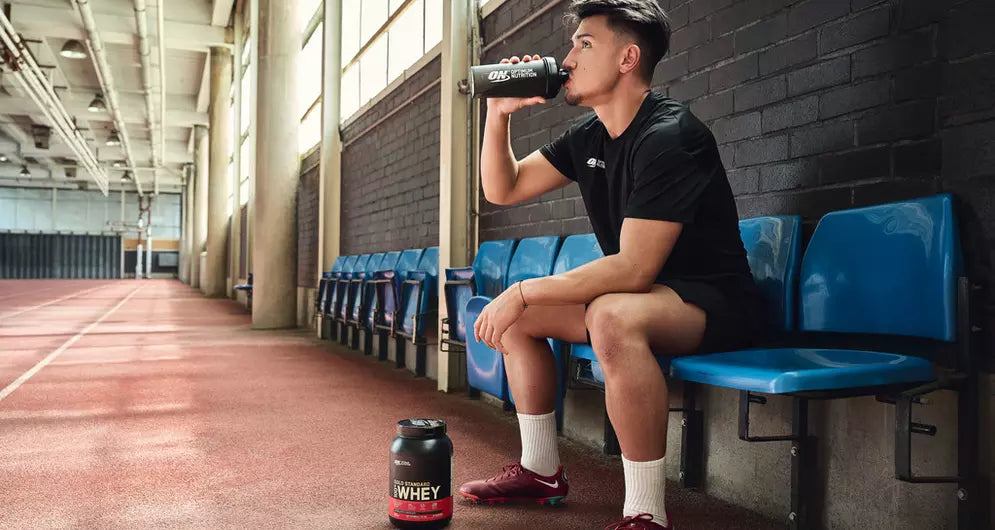By Dr. Mark Evans, PhD, Optimum Nutrition, EMEA Performance Nutritionist
Key Learnings
- Fuelling in the Build Up: Rugby players should increase their carbohydrate intake in the 36 to 48 hours before a game.
- Starting Strong: The Match Day Breakfast: Aim for 1.0-1.4 g of carbohydrate per kilogram body mass at breakfast, 90-120g of carbohydrates for a 90kg player.
- Match Day Snacks: Players should opt for snacks that are high in carbohydrates and easy to digest. Bananas, granola bars, yogurts, and bagels are all excellent choices.
- The Pre-Match Meal: The Cherry on Top: It’s recommended that players consume their pre-match meal about 3 hours before the game.
- At The Ground – Dressing Room and Pitch Side: Players are recommended to take on 30-60g of carbohydrate per hour of activity
- Winning Recovery: Post-Match Strategies: Recovery should start in the dressing room immediately after the match with a shake, followed by a large post-match meal 1-2 hours later.
Contents
- Fuelling in the Build Up
- Starting Strong: The Match Day Breakfast
- Match Day Snacks
- The Pre-Match Meal: The Cherry on Top
- At The Ground – Dressing Room and Pitch Side
- Winning Recovery: Post-Match Strategies
Nutrition isn’t just about building muscle or losing weight; it’s a cornerstone of performance, especially in preparation for match day. This article will explain how rugby players fuel for matches, with a focus on scientific recommendations for macronutrient amounts and practical food tips for each meal. Understanding the relationship between the two is key to unlocking peak performance on the field and bringing the Six Nations trophy home.
Fuelling in the Build Up to a Match
Nutrition in the days leading up to the match plays a role in ensuring the players have the energy they need to play with intensity. Carbohydrate loading, a strategy widely recommended in sports nutrition, is crucial. This is because carbohydrate stored in the muscle as glycogen is the main source of fuel for high intensity, intermittent activities like rugby union. Rugby players will increase their carbohydrate intake in the 36 to 48 hours before a game can significantly enhance glycogen stores in muscles, giving them more fuel to use on the pitch. The recommended amount of carbohydrate during this time is 10-12 g of carbohydrate per kilogram body mass per day. For a 90 kg rugby players, this would mean 900-1080g of carbohydrate in the days leading to a match. Players should focus on incorporating carbohydrate-rich foods like oats, pasta, rice, potatoes, noodles into their main meals. Carbohydrate rich snacks include scones, cereals, breads, granola bars, and fruit juice. Players will typically have 3 main meals on these days; breakfast, lunch and dinner, with two snacks between these meals and a snack before bed; making sure they include a source of carbohydrates in each one.
Starting Strong: The Match Day Breakfast
The match day begins with breakfast, a meal that sets the tone for the day. The focus at breakfast is again on carbohydrates, with a moderate amount of protein, and low in fat and fibre; this meal combination helps supply the carbohydrates needed to perform, while being easily digestible to reduce the chances of stomach discomfort. Players are recommended to aim for 1.0-1.4 g of carbohydrate per kilogram body mass at breakfast, 90-120g of carbohydrates for a 90kg player. Breakfast choices generally include pancakes, porridge with honey and fruit; whole grain toast and marmalade with a side of eggs; a fruit smoothie made with orange juice, oats, yogurt and berries. Hydration, too, should not be neglected, with water and electrolyte-containing drinks being essential.
Match Day Snacks
Some players may prefer larger meals in the build-up on match day, and others will prefer to snack throughout the day. Snacking is not about indulgence but continuing to build energy stores. Players should opt for snacks that are high in carbohydrates and easy to digest. Bananas, granola bars, yogurts, and bagels are all excellent choices.
The Pre-Match Meal: The Cherry on Top
One of the mistakes players make when fuelling for a match is placing too much importance on the pre match meal. It is important but it is only a top up for the energy stores the players have been building up for the last two days. It’s recommended that players consume their pre-match meal about 3 hours before the match. This timing allows for proper digestion and absorption of nutrients while lowering the risk of stomach discomfort during the match. A suitable amount is approximately 1-4 g of carbohydrates per kilogram body weight. This means a 90 kg player should eat 90-360 g of carbohydrates. This can be achieved by eating a combination of starchy carbohydrates such as pasta, rice, gnocchi, noodles with a tomato or teriyaki sauce alongside a side of soup, fruit, or yoghurt.
At The Ground – Dressing Room and Pitch Side
The dressing room is the last chance saloon for pre-match fuelling. Simple carbohydrates like fruit, carbohydrate gels, rice cakes, and granola bars can be effective. Hydration is also important; isotonic sports drinks help to hydrate, and provide carbohydrates and electrolytes that players lose through sweating during a match. Players should aim to eat one snack when arriving at the ground, before warming up. Caffeine is commonly consumed by players in dressing room before the match in the form of tablets, capsules, chewing gum, powders, such as ON Gold Standard Pre-Workout, and shots, such as ON Gold Standard Pre-Workout Shot. Caffeine improves various markers of team sport performance, including total running distance, sprint distance, and number of sprints, making it an essential supplement for rugby players on match day.
Once the match starts, players are recommended to take on 30-60g of carbohydrate per hour of activity. The opportunities to take on this amount of fuel in the middle of a match are limited, so breaks in play need to be taken advantage of including the half-time break. A typical 500 ml bottle of isotonic energy drink contains 30 g of carbohydrate. Consuming one bottle throughout a match, alongside a granola bar at half time will provide the energy required to go as long in to the second half as possible.
Winning Recovery: Post-Match Strategies
Post-match nutrition is all about the 3 R’s of recovery nutrition; Replenish carbohydrate stores, repair with protein and replace water lost. Post-match recovery should start immediately in the dressing room after the match with a recovery shake containing carbohydrates to replace the energy stores we have used and protein to help repair our muscle tissue. The right balance of carbohydrates and protein is essential for muscle repair and glycogen replenishment. A carbohydrate: protein ratio of 3:1–4:1 is recommended. This shake can include milk, fruit, oats, and whey protein, such as ON Gold Standard Whey, to meet all aspects recovery. Players will then have a post-match meal that should look similar to their pre match meal, helping to continue the recovery process. Depending on the time of day, players may be able to fit in another meal within 1-2 hours of their post-match meal, or a snack before bed.
Conclusion
In rugby union, the difference between a good and a great performance can often be traced back to nutrition, especially on match day. The strategies outlined here, from the 2 days before the match to post-match recovery, are designed to improve performance and enhance recovery. Implementing these nutritional practices can be a game-changer for any rugby player aiming to excel in tournaments like the Six Nations.
References
- Burke, L. M., Hawley, J. A., Wong, S. H., & Jeukendrup, A. E. (2011). Carbohydrates for training and competition. Journal of Sports Sciences: 29(sup1), S17-S27.
- Williams, C., and Rollo, I. (2015). Carbohydrate Nutrition and Team Sport Performance. Sports Med: 45 (suppl 1), S13-S22.
- Salinero. J.J., Lara. B., & Del Coso J. (2019) Effects of acute ingestion of caffeine on team sports performance: a systematic review and meta-analysis. Res Sports Med: Apr-Jun;27(2):238-256.
- Ivy, J. L., et al. (2002). Early postexercise muscle glycogen recovery is enhanced with a carbohydrate-protein supplement. Journal of applied physiology (Bethesda, Md. : 1985), 93(4), 1337–1344.








